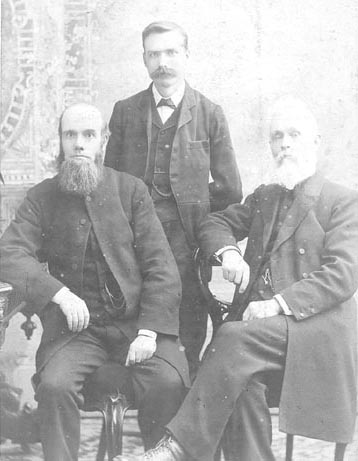

(rear) Dr. Arthur Peake; (front left) Rev. John Smith; (front right) Rev. John Watson; c1900
« Arthur Samuel Peake was born in Leek, Staffordshire, in 1865. His father, Samuel Peake, was a Primitive Methodist minister, and consequently the family moved quite frequently during Peake's childhood... [Arthur] received most of his secondary education at the King Henry VIII Grammar School in Coventry. From here he gained a scholarship to St. John's College, Oxford, and went up in 1883 to read classics. In 1885 he turned to theology and he gained first class honours in the school of theology in 1887... He received his MA in 1891... Peake at one time thought of being ordained into the Church of England, as he wished to do pastoral work... In the end he realised that his vocation was that of teaching, and he remained a layman.
In 1890 Peake gained a fellowship at Merton College ... In the same year, he was invited to join the staff of Mansfield College, where he taught Hebrew, Old Testament theology and patristic texts. While in Oxford he met the manufacturer and philanthropist Sir William P. Hartley ... who provided funding for the appointment of a tutor at the [Primitive Methodist Theological] Institute [in Manchester], and was instrumental in persuading the College Committee to invite Peake to this post... In 1892 Peake arrived in Manchester. At first he was sole tutor in the college, so as well as teaching, he was also responsible for the development of the entire curriculum... Peake was also responsible for replenishing the Institute library.
Hartley College was not the only call on Peake's resources. Early in his career in Manchester he was asked to teach Old Testament in Lancashire Independent College which he did from 1895, and from 1904 he also taught in the United Free Methodist in Victoria Park... Another major part of his work was that in the University of Manchester... A Faculty of Theology was established [and] Mrs. Rylands provided a bequest [establishing] the Chair of Biblical Criticism and exegesis in 1904. Peake was appointed to this Chair, being the first non-Anglican to become a professor of divinity in an English university... His talents as an administrator were demonstrated in his work as the first Dean of the Faculty of Theology, 1904-1908, and later in the post of Pro-Vice-Chancellor, to which he was appointed in 1925.»
Peake was an original member of the Society for Old Testament Study, which was established in 1916 ... In 1922, member of a sub-committee of Anglicans and Free Churchmen ... In 1927, member of the Conference on Faith and Order held in Lausanne ... In 1928, President of the National Council of Evangelical Free Churches.
His lectures and articles appeared in many journals, including the Bulletin of the John Rylands Library, Holborn Review, Times Literary Supplement, Primitive Methodist Leader, Methodist Times, British Weekly, and British Friend. He contributed to the Dictionary of the Bible, Dictionary of Christ and the Gospels, and Encyclopaedia of Religion and Ethics. He edited Commentary [on the Bible] (1919), The People and the Book (1925) and An Outline of Christianity: the story of our civilization (1925). His books included A Guide to Biblical study (1897), and The Bible: its origin, its significance and its abiding worth (1913).
Text extracted from Handlist of the manuscripts of Arthur Samuel Peake, John Rylands University, Manchester